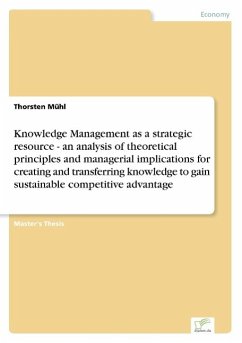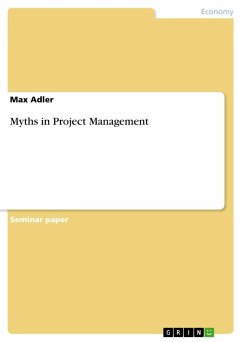Master's Thesis from the year 2002 in the subject Business economics - Business Management, Corporate Governance, grade: 1,0, South Bank University London (unbekannt), language: English, abstract: Inhaltsangabe:Abstract:
With the beginning of the 1990s, the knowledge era arrived and virtually no organisation can afford to neglect a thorough and methodical discussion on the idea of "managing knowledge". The importance and the prominent role knowledge plays today cannot be overemphasised. As we shall see later on, knowledge and the ability to leverage it provides a comprehensive source of competitive advantage.
Keeping this idea in mind the subsequent research project is structured in three main parts. The first part provides an introduction into the field of knowledge. General ideas will be explained, definitions and rationalisations shall be provided. Part two is designed to examine the two central columns of knowledge management: the creation and the transfer of knowledge. In order to analyse both subjects in an entire, comprehensive way, the subsequent dissertation outlines differences and similarities between the two most prominent methodologies: the Anglo-Saxon and the Japanese approach.
Within the third part it is intended to combine theoretical findings and pragmatic insights (although the whole paper is for the most part of theoretical nature, cf. research methodology) to develop managerial implications for knowledge management. To be precise, what are the prerequisites of knowledge management? In order to further develop the methodological approach, I structured the part in four points that I consider as the unconditional, complete preconditions for effective knowledge management: culture, HR issues, strategy, and process.
The four issues ought to build the foundation for every successful knowledge management initiative.
To underline theoretical results the appendix provides two case studies (Siemens and IBM Global Service) as well as a practical guide for measuring knowledge (from the American Productivity and Quality Centre).
Generally speaking, the subject matter knowledge management is of profound interest within the discipline of strategic management. Literature on the topic is virtually impossible to count. Nevertheless, within the research paper I intend to concentrate on the most well-known and recognised scholars who worked and still perform on knowledge management. The objective of the subsequent paper is to provide an overview of one of the most difficult and noteworthy topics in strategic management and to examine and analyse different approaches as well as to develop own ideas of so-called key-success factors.
For many years, the concept of knowledge management (henceforth KM) never received substantial or precise notice within the vast, extensive area of strategic management. On the contrary, today s business environment is determined and shaped by the awareness of its significance and corporate strategies without the contemplation of KM are virtually unthinkable.
"The realization that knowledge is the new competitive resource has hit the West like lightning." Nonaka and Takeuchi flawlessly underline the magnitude of KM in a globally increasing economy. There is a perception that we are moving into an epoch in which conventional pillars of economic strength capital, land, plant, and labour are no longer the overarching forces behind market success. Technical progress indicates that an expanding number of organisations are valued by their competency in the development, employment and distribution of knowledge or information. KPMG predicts the total transformation of the industrial economy to a Knowledge Economy.
Given the importance of such an expansion, it is by no means surprising that organisations everywhere are paying attention to the opportunity of creating, transferring, and employing knowledge efficiently. Companies ...
Hinweis: Dieser Artikel kann nur an eine deutsche Lieferadresse ausgeliefert werden.
With the beginning of the 1990s, the knowledge era arrived and virtually no organisation can afford to neglect a thorough and methodical discussion on the idea of "managing knowledge". The importance and the prominent role knowledge plays today cannot be overemphasised. As we shall see later on, knowledge and the ability to leverage it provides a comprehensive source of competitive advantage.
Keeping this idea in mind the subsequent research project is structured in three main parts. The first part provides an introduction into the field of knowledge. General ideas will be explained, definitions and rationalisations shall be provided. Part two is designed to examine the two central columns of knowledge management: the creation and the transfer of knowledge. In order to analyse both subjects in an entire, comprehensive way, the subsequent dissertation outlines differences and similarities between the two most prominent methodologies: the Anglo-Saxon and the Japanese approach.
Within the third part it is intended to combine theoretical findings and pragmatic insights (although the whole paper is for the most part of theoretical nature, cf. research methodology) to develop managerial implications for knowledge management. To be precise, what are the prerequisites of knowledge management? In order to further develop the methodological approach, I structured the part in four points that I consider as the unconditional, complete preconditions for effective knowledge management: culture, HR issues, strategy, and process.
The four issues ought to build the foundation for every successful knowledge management initiative.
To underline theoretical results the appendix provides two case studies (Siemens and IBM Global Service) as well as a practical guide for measuring knowledge (from the American Productivity and Quality Centre).
Generally speaking, the subject matter knowledge management is of profound interest within the discipline of strategic management. Literature on the topic is virtually impossible to count. Nevertheless, within the research paper I intend to concentrate on the most well-known and recognised scholars who worked and still perform on knowledge management. The objective of the subsequent paper is to provide an overview of one of the most difficult and noteworthy topics in strategic management and to examine and analyse different approaches as well as to develop own ideas of so-called key-success factors.
For many years, the concept of knowledge management (henceforth KM) never received substantial or precise notice within the vast, extensive area of strategic management. On the contrary, today s business environment is determined and shaped by the awareness of its significance and corporate strategies without the contemplation of KM are virtually unthinkable.
"The realization that knowledge is the new competitive resource has hit the West like lightning." Nonaka and Takeuchi flawlessly underline the magnitude of KM in a globally increasing economy. There is a perception that we are moving into an epoch in which conventional pillars of economic strength capital, land, plant, and labour are no longer the overarching forces behind market success. Technical progress indicates that an expanding number of organisations are valued by their competency in the development, employment and distribution of knowledge or information. KPMG predicts the total transformation of the industrial economy to a Knowledge Economy.
Given the importance of such an expansion, it is by no means surprising that organisations everywhere are paying attention to the opportunity of creating, transferring, and employing knowledge efficiently. Companies ...
Hinweis: Dieser Artikel kann nur an eine deutsche Lieferadresse ausgeliefert werden.








